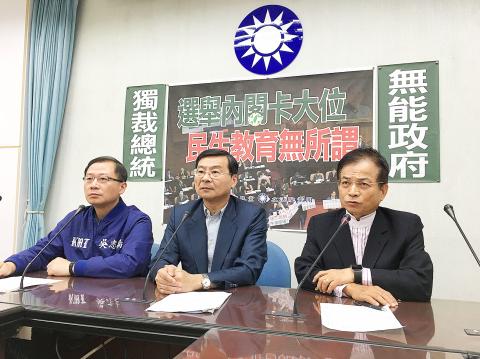The Chinese Nationalist Party (KMT) yesterday said that the latest Cabinet reshuffle was creating an “election Cabinet,” showing that the Democratic Progressive Party (DPP) is more concerned with staying in power than protecting the public’s rights.
Appointing Executive Yuan spokesman Hsu Kuo-yung (徐國勇) as Minister of the Interior shows that the DPP is solely concerned with candidates’ political correctness, rather than their capabilities, KMT Culture and Communications Committee deputy director-general Hung Meng-kai (洪孟楷) said.
Reappointing Minister of the Interior Yeh Jiunn-rong (葉俊榮) as minister of education after a month-long vacancy shows that academics were reluctant to accept the position following the DPP government’s handling of the “Kuan Chung-ming (管中閔) incident,” Hung said.

Photo: Lin Liang-sheng, Taipei Times
The government has refused to confirm Kuan as National Taiwan University (NTU) president after his election by committee on Jan. 5 and in April said it would not appoint him, as he faced allegations that he failed to report a potential conflict of interest and of possible academic misconduct, including illegally teaching at Xiamen University in China.
Yeh is also accused of illegally having taught in China, so appointing him as education minister would only cause further controversy, Hung said.
Yeh was in April accused of having broken the law by teaching at Zhejiang University’s Guanhua Law School from Dec.19, 2011, to Jan. 15, 2012, while he was a professor at NTU.
He has denied the allegations, saying that he was not paid for the lectures in China.
While the unpopularity of Minister of Transportation and Communications Hochen Tan (賀陳旦) merited his dismissal, replacing him with Taiwan International Ports Corp chairman Wu Hong-mo (吳宏謀) — who is said to be part of Presidential Office Secretary-General Chen Chu’s (陳菊) clique — is an obvious political plum, Hung said.
The politically-inspired appointments on the heel of the Legislative Yuan’s extraordinary session were made with the year-end elections in mind, but such blatant “redirection” of resources is a double-edged sword that could turn the public against the DPP, Hung said.
A Cabinet reshuffle was to be expected, as there had not been a major one since Premier William Lai (賴清德) was appointed to the position in September last year, KMT legislative caucus secretary-general William Tseng (曾銘宗) said.
However, an election-oriented Cabinet is not in the nation’s long-term interest, as elections are held every four years, he said.
Yeh’s performance as interior minister was adequate, but he is not a suitable appointment as minister of education, Tseng added.
Hsu’s appointment as Minister of the Interior was politically motivated, Tseng said, adding that Hsu’s public image has been tarnished by his attempts to obfuscate information and tendency to argue, rather than communicate, during his tenure as Executive Yuan spokesman.
New Power Party (NPP) caucus convener Hsu Yung-ming (徐永明) said he hopes that the Cabinet reshuffle was not entirely politically motivated and was somehow meant to strengthen ongoing reforms.
“We hope the new ministers will address expectations on sports reform, protection of rights for police and firefighters, renewed efforts to introduce judicial reforms and financial reforms,” Hsu said.
People First Party caucus whip Lee Hung-chun (李鴻鈞) said that the DPP should appoint individuals with the national interest in mind.
The national interest, not party interest, should be of primary concern when planning Cabinet reshuffles, Lee said.
Additional reporting by CNA

Taiwanese can file complaints with the Tourism Administration to report travel agencies if their activities caused termination of a person’s citizenship, Mainland Affairs Council Minister Chiu Chui-cheng (邱垂正) said yesterday, after a podcaster highlighted a case in which a person’s citizenship was canceled for receiving a single-use Chinese passport to enter Russia. The council is aware of incidents in which people who signed up through Chinese travel agencies for tours of Russia were told they could obtain Russian visas and fast-track border clearance, Chiu told reporters on the sidelines of an event in Taipei. However, the travel agencies actually applied

Japanese footwear brand Onitsuka Tiger today issued a public apology and said it has suspended an employee amid allegations that the staff member discriminated against a Vietnamese customer at its Taipei 101 store. Posting on the social media platform Threads yesterday, a user said that an employee at the store said that “those shoes are very expensive” when her friend, who is a migrant worker from Vietnam, asked for assistance. The employee then ignored her until she asked again, to which she replied: "We don't have a size 37." The post had amassed nearly 26,000 likes and 916 comments as of this

New measures aimed at making Taiwan more attractive to foreign professionals came into effect this month, the National Development Council said yesterday. Among the changes, international students at Taiwanese universities would be able to work in Taiwan without a work permit in the two years after they graduate, explainer materials provided by the council said. In addition, foreign nationals who graduated from one of the world’s top 200 universities within the past five years can also apply for a two-year open work permit. Previously, those graduates would have needed to apply for a work permit using point-based criteria or have a Taiwanese company

The Shilin District Prosecutors’ Office yesterday indicted two Taiwanese and issued a wanted notice for Pete Liu (劉作虎), founder of Shenzhen-based smartphone manufacturer OnePlus Technology Co (萬普拉斯科技), for allegedly contravening the Act Governing Relations Between the People of the Taiwan Area and the Mainland Area (臺灣地區與大陸地區人民關係條例) by poaching 70 engineers in Taiwan. Liu allegedly traveled to Taiwan at the end of 2014 and met with a Taiwanese man surnamed Lin (林) to discuss establishing a mobile software research and development (R&D) team in Taiwan, prosecutors said. Without approval from the government, Lin, following Liu’s instructions, recruited more than 70 software